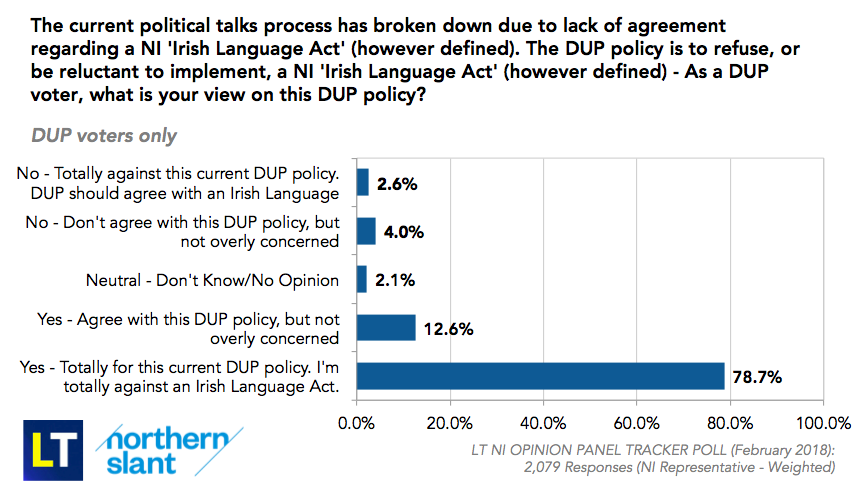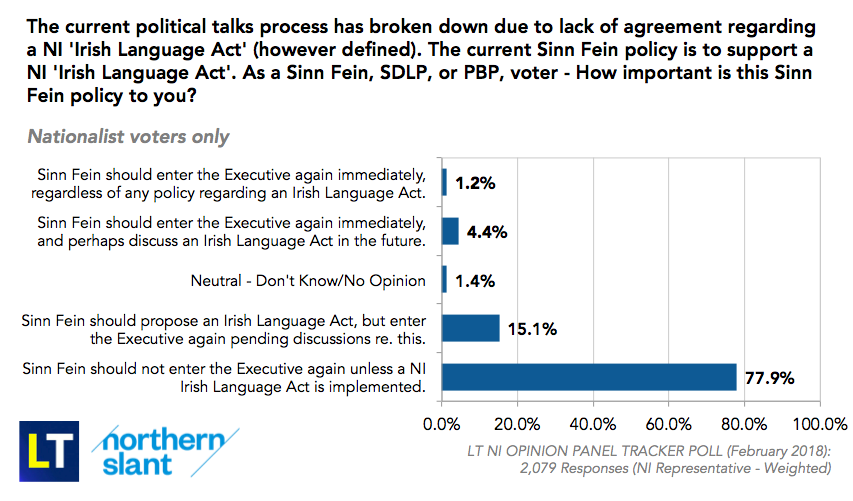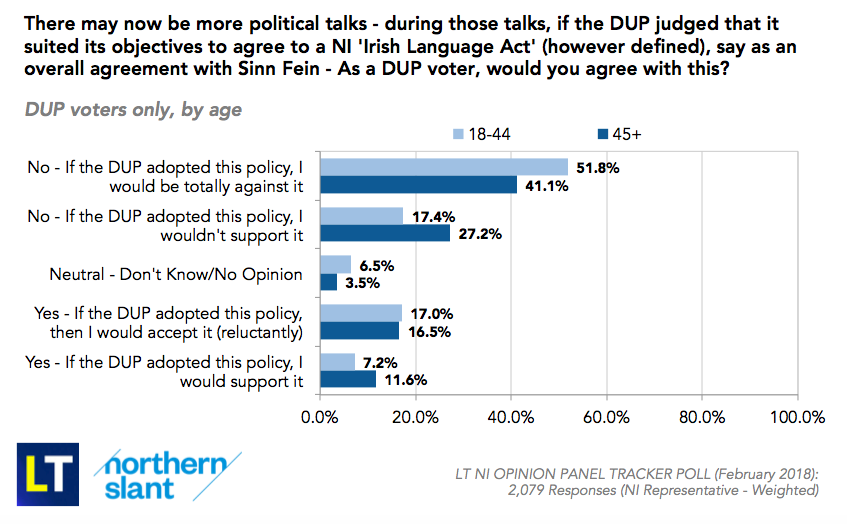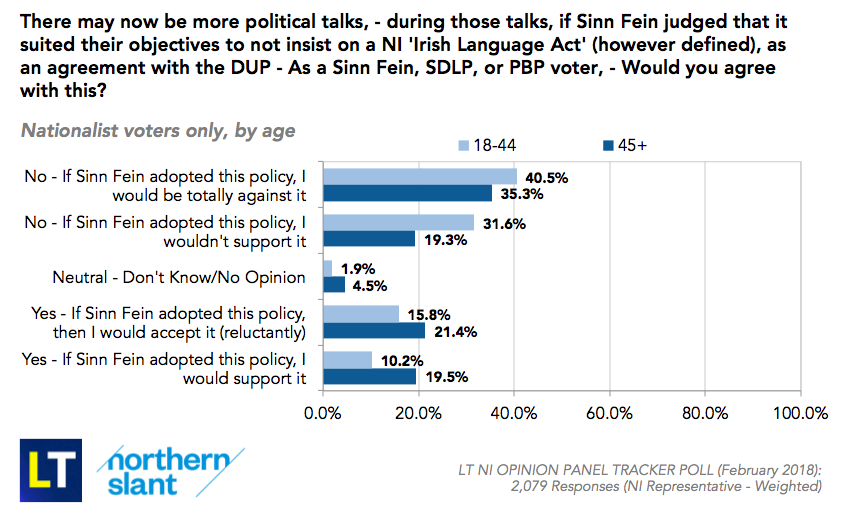Talks to restore power-sharing at Stormont broke down weeks ago, but the blame game continues to rumble along. The DUP blames Sinn Féin for making unreasonable demands; Sinn Féin blames the DUP for failing to compromise.
But if you’re trying to figure out why the talks failed, don’t just point fingers at the political parties and their negotiating teams. The latest poll from our partner LucidTalk makes it very clear: voters themselves are polarised on an Irish Language Act, and they’re not in a compromising mood.
Over 90% of DUP voters support their party’s position against an Irish Language Act – and it’s not just DUP voters who are against it. 70% of voters of other unionist parties support the DUP on this.
Nationalist and republican voters are similarly resolute, 78% of whom think that Sinn Féin should only return to the Executive if an Irish Language Act is part of the deal to restore power-sharing.
That doesn’t make for the easiest starting point for either the DUP or Sinn Féin. How do you square the circle?
Things become even more daunting when you consider voters’ attitudes towards hypothetical scenarios involving compromise by their party.
A decisive majority of DUP voters (68.7%) say they would oppose the party accepting an Irish Language Act during the course of any future negotiations. Among nationalist and republican voters, 63.7% say they would be opposed to Sinn Féin dropping its insistence on an Irish Language Act.
Predictable enough, you might think. What’s less predictable is the breakdown of these positions along generational lines.
Younger DUP voters (that is, those aged 18-44) take a more uncompromising position than older voters (those aged 45 years and above). 51.8% say they would be totally against the DUP softening its position – ten percentage points higher than to the older age group.
Among nationalist and republican voters there are some similarities. Over 70% of those aged 18-44 would be opposed to Sinn Féin softening its position on an Irish Language Act, compared to 55% of those aged 45 and above.
The bottom line is that neither the DUP nor Sinn Féin have much room for manoeuvre if they are to avoid alienating their own supporters.
But this is hardly the end of the story. For one thing, voters’ attitudes for and against an Irish Language Act haven’t appeared out of nowhere. They are the product of history, group identity and political campaigning (among other things). The DUP has spent much of the last year warning of the dangers of an Irish Language Act – and feeding the ‘crocodiles’. Sinn Féin, meanwhile, successfully mobilised many younger voters around Irish language legislation as a rights issue in the last Assembly election.
In other words, we shouldn’t expect voters of either party to feel comfortable with the prospect of compromise on an issue that was presented by both parties as being so fundamental to the interests of each respective community.
If you thought that younger voters might be more flexible in their approach, these numbers are a wake-up call for political parties. Their voters growing up and entering adulthood predominantly in the post-Agreement era appear to have less patience than those of an older generation.
Is there any prospect of a future deal between the DUP and Sinn Féin, based on these numbers? Possibly. Attitudes can change, and other issues can become more important in voters’ minds as time moves on. In the meantime, if either party wants to compromise on an Irish Language Act – “however defined,” as the poll question ominously put it – it will either take some imaginative ‘redefining’ to make it acceptable, or else it will have to persuade its voters that a different path is better after all. That would require some confident leadership.
Attitudes have hardened. In turn, hard choices will have to be made if the stalemate at Stormont is to be broken.
Further coverage of LucidTalk’s latest poll on Northern Slant
- ‘Is this the end of the road for devolution?’ by James McMordie
- ‘How much do we trust politicians?’ by Roger Greer
Methodology, and more on LucidTalk
Polling was carried out by Belfast based polling and market research company LucidTalk.
Polling was carried out by Belfast based polling and market research company LucidTalk. The project was carried out online for a period of 80 Hours from 1pm 23rd February 2018 to 9pm 26th February 2018 (80 Hours). The project targeted the established Northern Ireland (NI) LucidTalk online Opinion Panel (10,387 members) which is balanced by gender, age-group, area of residence, and community background, in order to be demographically representative of Northern Ireland.
3,131 full responses were received, and a data auditing process was carried out to ensure all completed poll-surveys were genuine ‘one-person, one-vote’ responses, and also to collate a robust and accurate balanced NI representative sample. This resulted in 2,079 responses being considered in terms of the final results – the results presented in this report. All data results have been weighted by gender and community background to reflect the demographic composition of Northern Ireland resulting in 2,079 responses being considered in terms of the final results. All data results produced are accurate to a margin of error of +/-3.0%, at 95% confidence.
LucidTalk is a member of all recognised professional Polling and Market Research organisations, including the UK Market Research Society (UK-MRS), the British Polling Council (BPC), and ESOMAR (European Society of Market Research organisations).
For more information, visit www.lucidtalk.co.uk and follow @LucidTalk on Twitter.
Also published on Medium.




